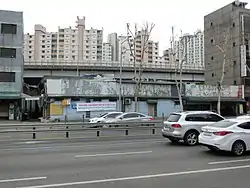Miari
Mia-ri is one of largest red-light districts in Seoul, South Korea.[1] Located in the Wolgok-dong area at Gireum Station,[2] it is also known as Miari Texas[2] or Texas Miari after the American servicemen that helped popularise the area.[3] The area is entered through a curtain at the entrance to an alleyway.[2] Several other alleys come off this alley.[2][4] Outside each of the buildings stands an ajumma, who tries to entice clients to enter.[2]
Mia-ri | |
|---|---|
 Mia-ri | |
| Nickname(s): Miari Texas, Texas Miari | |
| Country | South Korea |
| City | Seoul |
History
Even though prostitution was made illegal in 1961,[5] police action was generally limited to the suppression of human trafficking and underage prostitution.[6] The police were often bribed by the brothels.[3]
In January 2000, the district appointed a new police chief, Kim Kang Ja, who was Korea's first female police chief.[3] Kang Ja claimed 80% of the area's 1,500 prostitutes were underage.[3] She instigated many raids[6] to try and eliminate underage prostitution.[3] At least 40 of the estimated 260 brothels were closed,[3] and underage prostitution virtually eliminated in Miari.[5]
Kang Ja's crackdown precipitated a 50-day national anti-prostitution campaign and a change in the law.[3] The law now allowed police to name people who used underage prostitutes, tripled jail sentences and fines for pimps and no longer treated underage prostitutes as criminals.[3]
Following the 2004 anti-prostitution laws, which define prostitution as a form of human trafficking,[7] further police actions occurred in Miari.[6]
References
- "3,000 Sex Workers Protest Threat to Livelihood". The Seoul Times. 2006. Retrieved 21 July 2006.
- "Miari Texas in Gireum". Rokit Reports. 21 January 2016. Retrieved 23 March 2018.
- Baker, Michael (10 March 2000). "S. Korea's first female chief of police tackles prostitution". Christian Science Monitor. Retrieved 24 March 2018.
- Ghani, Faras; Borowiec, Steven (19 March 2018). "South Korea: Sex workers hit hard by government's crackdown". Aljazeera. Retrieved 24 March 2018.
- Kim, Seung-kyung; Kim, Kyounghee (2014). The Korean Women's Movement and the State: Bargaining for Change. Routledge. ISBN 9781317817789.
- "Hookers complain of hardship after anti-prostitution law enacted". Donga. 22 September 2012. Retrieved 24 March 2018.
- "Sex Work Law - Countries". Sexuality, Poverty and Law. Retrieved 23 March 2018.
External links
- MIARI TEXAS (RED LIGHT DISTRICT) Korea Seoul -just walking - Walk through Miari on YouTube (2017)